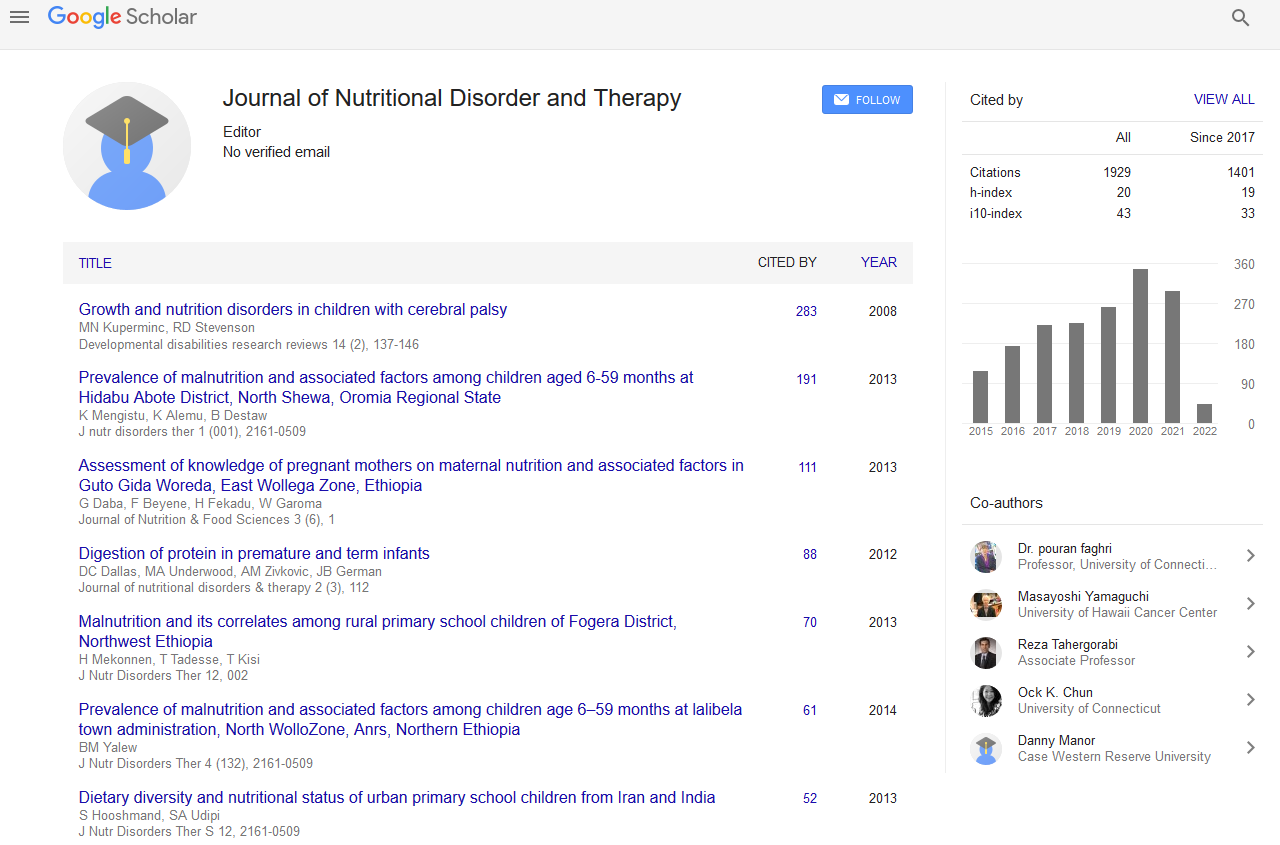Indexed In
- Open J Gate
- Genamics JournalSeek
- Academic Keys
- JournalTOCs
- Ulrich's Periodicals Directory
- RefSeek
- Hamdard University
- EBSCO A-Z
- OCLC- WorldCat
- Publons
- Geneva Foundation for Medical Education and Research
- Euro Pub
Useful Links
Share This Page
Journal Flyer

Open Access Journals
- Agri and Aquaculture
- Biochemistry
- Bioinformatics & Systems Biology
- Business & Management
- Chemistry
- Clinical Sciences
- Engineering
- Food & Nutrition
- General Science
- Genetics & Molecular Biology
- Immunology & Microbiology
- Medical Sciences
- Neuroscience & Psychology
- Nursing & Health Care
- Pharmaceutical Sciences
Propolis extracts protects pancreatic beta cells from oxidative stress in-vitro
JOINT EVENT: 13th International Congress on Advances in Natural Medicines Nutraceuticals & Neurocognition & 14th International Conference on Clinical Nutrition
July 27-29, 2017 Rome, Italy
Sergio Wehinger
University of Talca, Chile
Posters & Accepted Abstracts: J Nutr Disorders Ther
Abstract:
Introduction: Oxidative stress has been considered as one of the most important causative agents in the pancreatic �?²-cells dysfunction and demise observed in the pathogenesis of type 2 diabetes mellitus. Previously, our group reported that MIN6, a murine �?²-cell line, showed a significant increase in reactive oxygen species (ROS) after an incubation with high levels of pamitic acid, one of the main circulating saturated free fatty acids and this was associated with an increment in apoptosis levels, suggesting an interesting link between lipotoxicity and oxidative stress in �?²-cells. Propolis is a resinous product of honey bees, rich in compounds with antioxidant properties: polyphenols and flavonoids. Considering this, we proposed to evaluate whether aqueous extracts of propolis exhibit protective effects against oxidative stress in vitro in mouse �?²-cells. Methods: We prepared methanolic extracts of propolis form Central Region of Chile, and they were diluted in sterile distilled water. An apoptosis assay based on annexin V-FITC by flow cytometry was performed to assess cell viability in �?²-TC cells, a �?²-cell line from mice, after exposition to hydrogen peroxide or tert-butyl hydroperoxyde in vitro. Also, we evaluated TBARS (lipoperoxidation) and reduced glutathione levels (GSH) to determine the cellular oxidative stress. A tentative identification of propolis main compounds was made with HPLC-DAD (diode array detector) analysis. Results: Exposure to oxidants results in a significant increase in TBARS levels and a decrease in GSH, but this was reversed with incubation with propolis extracts. Accordingly, apoptotic cell population induced by the oxidants was significantly reduced by incubation with propolis extracts. Finally, gallic acid, caffeic acid and ferulic acid were found to be the main phenolic compounds. Conclusion: Aqueous Propolis extract showed a significant antioxidant and protective effect against oxidative stress in beta pancreatic cells cultured in vitro.
Biography :
Sergio Wehinger has completed his PhD in Biomedical Sciences from University of Chile in 2013 and he is the Director of Magister in Biomedical Sciences of University of Talca. He has published more than 10 papers and currently he is investigating the molecular mechanisms involved in the cellular failure of the β pancreatic islets, which is induced by elevated free fatty acids and oxidative stress levels, to elucidate how to abolish these processes, especially by using natural compounds.


